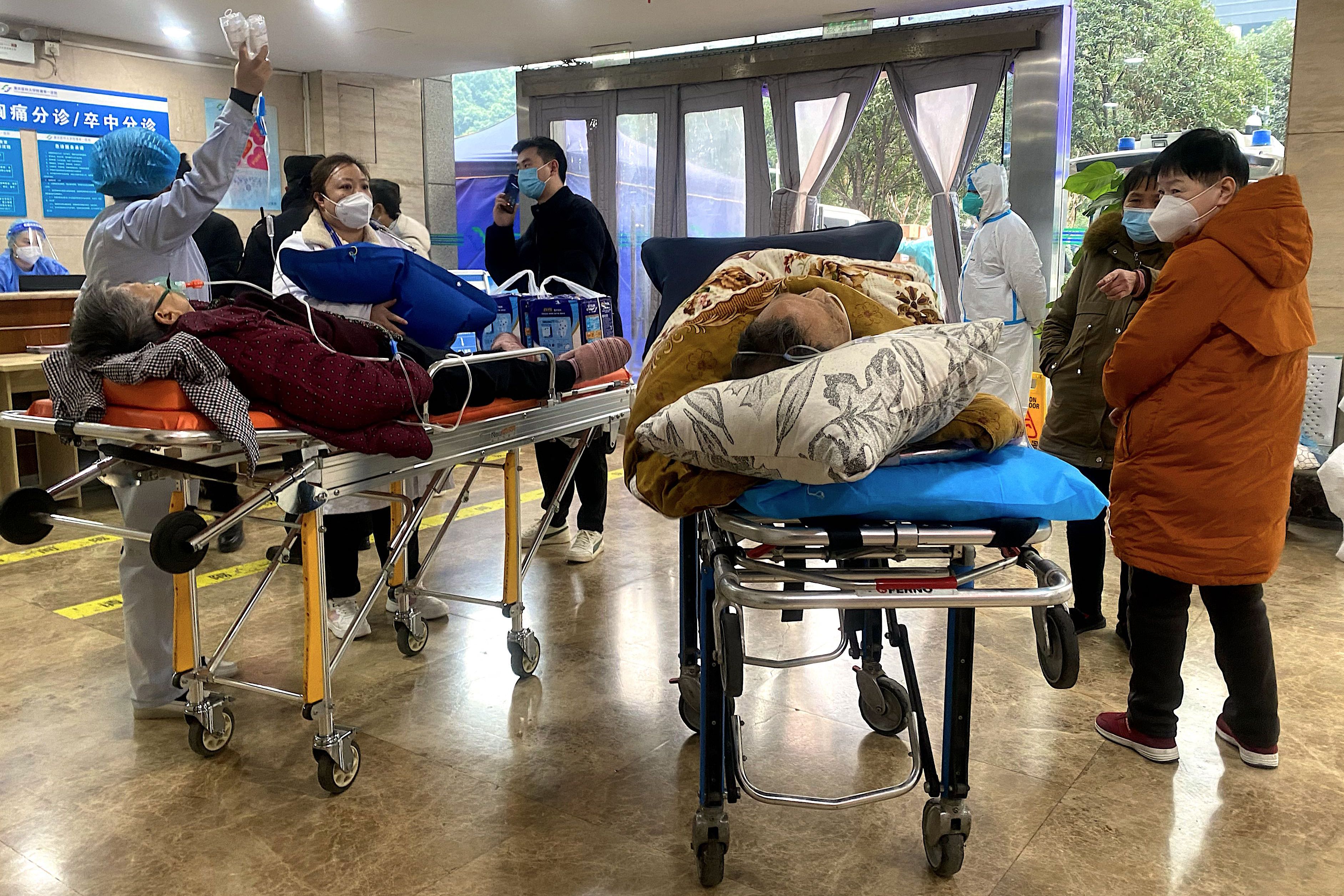China’s hospitals brace for ‘tragic battle’ as WHO cites worry over official Covid data
Christmas eve, New Year’s Day and the Lunar New Year destined to be unsafe, warns hospital

Shanghai should ready itself for a “tragic battle” against a surge in the number of Covid cases, experts have warned, as the virus sweeps across the huge city and large parts of China.
The warning comes as some question the accuracy of the government’s official figures of the number of those infected or dead from the virus.
“This year’s Christmas eve, New Year’s Day, and the Lunar New Year are destined to be unsafe,” warned Shanghai Deji hospital in a statement.
“In this tragic battle, the entire Greater Shanghai will fall, and we will infect all the staff of the hospital! We will infect the whole family! Our patients will all be infected! We have no choice, and we cannot escape,” it added.
The statement, shared on its official WeChat account, said about 5.43 million residents in Shanghai are already positive and another 12.5 million in China’s main commercial hub will get infected by the end of the year.
The post was no longer available on WeChat by Thursday afternoon and the claims made by the hospital could not be verified independently.
Even though China did not report any Covid deaths for a second consecutive day on Wednesday, workers in funeral stations said demand for cremation services has shot up in the past week.
The official death toll in China since the pandemic began three years ago stands at 5,241, with authorities saying there are 389,306 cases with symptoms.
A British-based health data firm, Airfinity, which said it had examined data from China‘s regional provinces, suggested infections could be as high as more than a million a day, noting that cases are rising quickly in the capital Beijing and southern province Guangdong.
Many areas of Shanghai were almost deserted on Thursday, with many residents isolating themselves and businesses forced to shut as staff fell ill.
“All our employees are sick,” a supermarket worker surnamed Wang told Reuters as he was shutting the doors. He said he hoped to reopen on 30 December.
The decision by the administration of Xi Jinping to start to dismantle harsh “zero-Covid” restrictions this month has caught a fragile health system by surprise.
The World Health Organization (WHO) has also voiced concern over China allegedly underreporting Covid casualties and said there was willingness to work to improve the way the country collects data around critical factors like hospital admissions and deaths.
WHO chief Tedros Adhanom Ghebreyesus iterated a demand for complete information from China.
“In order to make a comprehensive risk assessment of the situation on the ground, WHO needs more detailed information on disease severity, hospital admissions and requirements for ICU support,” the director general said in Geneva.
Mike Ryan, the agency’s emergencies director, said: “In China, what’s been reported is relatively low numbers of cases in ICUs, but anecdotally ICUs are filling up.
“I wouldn’t like to say that China is actively not telling us what’s going on. I think they’re behind the curve,” he added.
Meanwhile, several cities have also taken to dispensing free fever medicines. Authorities are also distributing millions of anti-fever medicines like ibuprofen to medical institutions and retail pharmacies, reported the state-run Global Times newspaper.
While the “zero-Covid” policy led to millions being confined to indoor settings for long periods of time and helped China avert massive outbreaks by tackling smaller infection clusters, the scrapping of the policies has led the general public to flock to hospitals and deal with a crumbling heath infrastructure.
The country is now witness to a rising rate of infections, parallel to the experience suffered by the US, Brazil and India in 2020 to 2021.
According to government data, China‘s vaccination rate is more than 90 per cent, but that number falls sharply in regards to the number of adults who have received booster vaccinations – 57.9 per cent. That drops again to 42.3 per cent for people aged 80 and above.
Germany said it has sent its first batch of BioNTech Covid vaccines to China to be administered initially to German expatriates. Berlin is pushing for other foreign nationals to be allowed to take them. BioNTech said on Thursday it had shipped 11,500 doses of the vaccine to China.
These would be the first mRNA vaccines, seen as most efficient against the disease, available in China.
Many of the country’s smaller cities are vulnerable to the rise in Covid cases, while hospitals in bigger cities scramble for beds.
Officials in northwestern Shaanxi province’s Tongchuan have said the city’s medical institutions “are under great pressure” and have asked retired medical workers to join the fight against Covid.
Grim visuals from a hospital in Beijing showed wards overflowing with patients – as many as 400 per day or four times more than before Covid struck the city.
“These patients are all elderly people who have underlying diseases, fever and respiratory infection, and they are in a very serious condition,” said Han Xue, deputy director of the hospital’s emergency department.
Some experts have warned of millions possibly dying from Covid in China, citing relatively low full vaccination rates among its vulnerable elderly population.
The current spread of the virus in China is thought to be driven by the Omicron subvariant, BF.7, which has been detected in other countries, including Britain, the United States and India, but does not seem to have triggered a surge of cases on the same scale as it has done in China.





Join our commenting forum
Join thought-provoking conversations, follow other Independent readers and see their replies
Comments